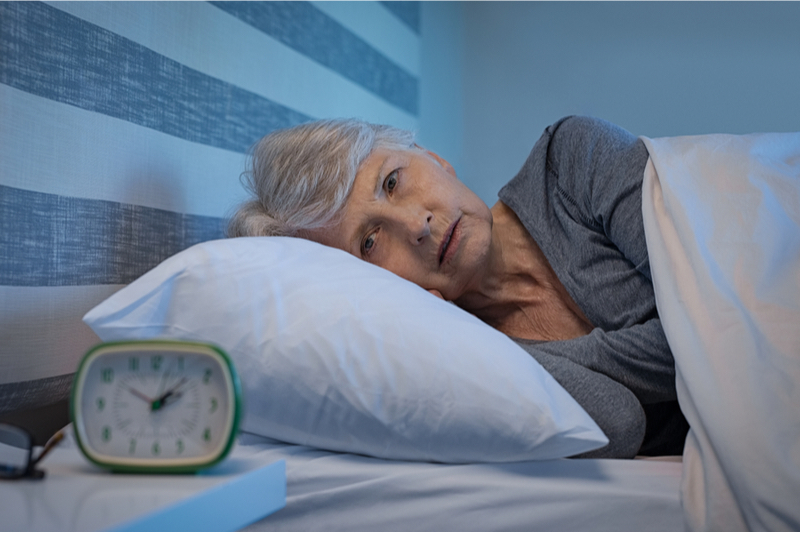Here you will discover ten tips regarding what you can do to improve your sleep —to get the necessary
- continuity (How often to you wake up at night? Is is easy to fall back asleep?)
- depth ( Are you getting enough deep, restorative sleep? How about REM sleep, when you should be dreaming?)
- duration (How many hours of sleep are you getting?)
- regularity (How’s that sleep schedule?)
So that, in the short term:
- When you wake up, you will feel better
- During the day, you will feel less tired
- At night, you will fall asleep more easily
- All day long, your sleep habits won’t stress you out
And, in the long term:
- Your focus and memory will improve.1On sleep and cognitive decline
- Your moods will be more balanced.2Sleep and emotions
- You will likely lose weight, if that’s what you want.3Sleep and obesity
- Your skin will look younger.4Sleep and skin ageing
- Your immune system will be stronger.5Sleep and immunity against infections
Check in with your medical support system
First, before you begin to address your sleep habits, you should probably rule out two things. One, that you have an underlying disorder that may be causing your problems. Two, that you are taking medication(s) that may be interfering with your sleep. That is to say, consult your health care provider about what to do about either of those possible causes.
What comes next assumes that you have done that, and that your sleep woes are caused by environmental factors, which are mostly in your control. I speak he truth here; they really are!
Think “slow and steady”
Second, any changes in habits, if you want them to last, should be made slowly and gradually. Think “baby steps”! Rome wasn’t built in a day, and all that. The human brain definitely needs the gradual approach, when it comes to habit formation.
Patience is key
Last but not least, be patient. Nobody has ever improved anything worthwhile by being yelled at, insulted, or treated with exasperated impatience. Be kind. To yourself!
Sleep aids with only great side effects
If you have read my previous blog posts on sleep6My blog posts on sleep , you have already learned that without restorative sleep, your chances of getting cancer, diabetes, Alzheimer’s, dementia, arthritis (and more…) increase significantly. The following ten behaviors will improve your chances of getting restorative sleep.
Here come the sleep aids:
What to do during the day:
- To begin, figure out at what time you should stop drinking coffee. If your sleep quality hasn’t been consistently good, then you should be aware that drinking coffee too late in the day is often the cause of that. Caffeine may be hanging out in your bloodstream for longer than you think! Even if you can fall asleep immediately after drinking a cup of coffee, the caffeine is affecting your sleep quality, and not in the right direction. Having said that, I must caution you from stopping cold turkey; caffeine is a drug that needs to be treated with respect. Quitting cold turkey could lead to even worse sleep, headaches, and other unwelcome effects.
You may want to choose a time, say noon, at which you’ll have your last cup. If you have been drinking coffee late in the day, here’s how to make this a sustainable habit:
- Start drinking your last cup of the day 30 to 60 (whichever seems easier at first) minutes earlier than you are used to doing.
- Every day, drink your last cup another 30 to 60 minutes earlier.
- And so on, until you have reached noon, or whatever time it is that you’ve chosen.
2. Later, be sure to get 20 to 30 minutes of outdoor daylight exposure every day, the earlier the better. This will set up your inner biological clock, which needs to be told when it’s daytime and when it’s not. Then, your eyes signal your brain, which signals the rest of your body to do its thing. You know, the thing that keeps you healthy.
3. Finally, get some exercise. Every day. Probably not in the evening. Preferably in the morning. Feel like exercising outdoors in the morning? Killing two birds, as it were. (see #3 above) You may be happy to hear that it doesn’t have to be that strenuous. A walk around the neighborhood counts. Just get your blood moving a bit faster.
Some of the benefits of exercise that relate to sleep are a decrease in stress levels, and a lowering of depression. Both of these sought-after results will make it much easier to fall asleep and could possibly prevent you from having negative thoughts.7Exercise and sleep Have you noticed that these tend to keep you awake?
What to do after dinner:
4. I can make this short: Don’t eat or drink anything. Except water. You have been warned: drinking water too late in the evening might wake you up a little earlier than you’d like.
If you really want to improve your chances of enjoying a healthy old age, don’t eat anything for at least three hours before bedtime.
At night, your body needs to work on repairing all the damage from the day, and it must expend energy on that — but spending precious resources on digesting late-night meals or snacks? That simply uses up that precious energy and robs your brain of its future clarity, at the very least.
What to do once you’re getting undressed:
5. Look around. Do you see your phone in your bedroom? Put it elsewhere.
If you do want to sleep well, it will get in your way. Big time.
If this seems difficult to you, do not try any other suggestion on this list. Work on this one first. It’s that important.
6. Is your TV on? Turn it off, unplug it, or move it into another room. It will disrupt your sleep.
Maybe you’re thinking that it actually helps you to fall asleep. That’s an unhelpful habit that you’ve developed nicely (we’ve all done it). But it can be changed, to benefit your future health outcomes.8Is it bad to watch tv right before bed?
Do you like to read before bed?
7. Are you planning on reading something on your e-reader or tablet? You may want to save those devices for daytime use and switch to old-fashioned paper books at night. The lights from your devices are giving the wrong signal to your brains, about what time it is. Your sleep will suffer!
When do you like to sleep?
8. Check the time. What time is it? Is it after or close to midnight? Humans are hard-wired to go to sleep not long after it gets dark. Deep sleep, the restorative sleep that regenerates your brain for the next day (and for your old age!), happens between 10:00 pm and 2:00 a.m. Yes, in your time zone!
We have been fooled into thinking that it is the number of hours we sleep that is paramount, and that we can log them at any time of the day. NO! It is the quality of sleep that is most important. And that good quality must be experienced at a particular time of night.
Here’s an easy solution:
Start going to bed 15 minutes earlier each night or so (Take as long as you like, to introduce this new habit) until you can wake up without an alarm, at the time that you need to. Think of ‘sleeping in’ as a fond memory of your youth. Your health will thank you. And you will feel better.
What to do in the middle of the night:
9. Are you awake? What emotions are you experiencing? Frustration? Fear of being a complete failure at your presentation in the morning? Worried that you’ll be dragging yourself, exhausted, throughout the next day? Have you started to think about all of your personal or family problems? Do you find yourself mulling over the past? Maybe planning or worrying about the future?
Here’s the thing: it is totally normal —not a sign of insomnia —to wake up during the night — more than once, in fact! It is what your mind does during that awake time that will make or break your experience of a good night’s sleep. Read on.
Try this, for a very pleasant side effect:
If you can sigh, laugh at your evident humanity, and remind yourself that sleeping is what your body wants to do and knows how to do, then you will assuredly be on your way to achieving your goal. Sleep experts have finally come to the realization that this attitude shift is responsible for being the main game-changer. Our own minds have been getting in the way of our getting the sleep that our bodies crave.
Being able to relax will be very helpful at this point. We’re talking about combating a major feedback loop here. We might be anxious during the day and find ourselves unable to turn that anxiety off at night. On the other hand, we may find ourselves unable to fall asleep, and the next thing we know, we’re experiencing anxiety!
Try some breathing!
Here’s something to try: that 4-7-8 breathing technique that I mentioned in a previous blog post.9Learn to manage your stress 10Dr. Weil’s 4-7-8 breathing exercise
Relax into it, becoming confident that your body knows what to do next. Sleep is the most natural of human activities; our bodies know how to fall asleep, if our minds would only get out of the way.
What to do in the morning:
10. First of all, according to all the experts, the key here is to wake up at the same time every day. To be clear, that means during the week as well as on weekends. Preferably without an alarm clock.11How to wake up without an alarm clock
You might want to consider starting this new habit on a day that you don’t need to get up early. Think of it as an experiment: what time do you wake up when your alarm isn’t there to wake you up? If that turns out to be too late in the morning, you will probably want to start gradually getting to bed a little earlier, until that amazing time when you’re getting just the right amount of sleep, with no alarms to wake you up before you’re ready to wake up.
If you’re starting to doubt your ability to change…
Your thoughts may now be lying to you by claiming that doing so will be impossible. It is not impossible. Trust me, our brains can change, at any age.12The Brain that Changes Itself by Norman Doidge
It will take some time to achieve this, so I’m going to repeat my encouragement to be both patient and hopeful, as you establish new habits.
Another strategy that will be necessary any time you think of adopting a new habit or breaking an old one: think about your ‘why.’ What possible reason could you have for wanting to get better sleep? And what makes that reason important? If you are able to keep the answers to those two questions at the top of your mind, you will succeed in making changes and in maintaining them. At any age.
Please don’t try these 10 suggestions at home all at once! Ease into them, one at a time, according to which one you think will give you your greatest Return on Investment. Once you feel confident that your new habit is solid, try another one. And so on. You get the drift.
References:
- 1
- 2
- 3
- 4
- 5
- 6
- 7
- 8
- 9
- 10
- 11
- 12
As we age, changing our habits without support can be challenging. Please feel free to contact me for a complimentary, no obligation strategy session. You will discover that, with the right support, almost any transformation is possible.
- 1
- 2
- 3
- 4
- 5
- 6
- 7
- 8
- 9
- 10
- 11
- 12




